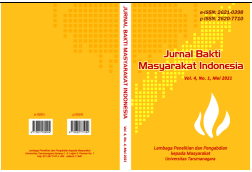EDUKASI MENGENAI PENGGUNAAN ANTIBIOTIK YANG RASIONAL DI LINGKUNGAN SMK NEGERI 1 TAMBELANG BEKASI
Main Article Content
Abstract
Antibiotics are antimicrobial drugs used to treat bacterial infections. High prevalence of infectious diseases, increasing the use of antibiotics in society. The high rate of antibiotics use without a doctor's prescription makes their use irrational and leads to drug resistance. One of the factors causing drug resistance is the lack of public knowledge about the use of drugs, especially antibiotics. Knowledge plays an important role in shaping certain beliefs, attitudes, and behaviors. The higher the level of education, it is expected that the better the level of knowledge on drug use. Studies to know the level of knowledge of residents using antibiotics, carried out in SMA and SMK Tambelang District Bekasi Regency, show that most respondents have insufficient knowledge (52.4%) of antibiotics. For this reason, PKM activities have been carried out in the form of education on the rational use of antibiotics, which was attended by 53 residents in SMK 1 Tambelang Bekasi, consisting of teachers, students, and educational staff. Before and after education, pretest and post-test were carried out to assess knowledge of antibiotics use. The mean pretest score was 8.08 points, and the post-test mean score was 9.42 points. Statistical analysis showed a mean difference between the pretest and post-test values of 1.34 points with a p-value of 0.008 (p <0.05). With the results obtained, it is expected to increase the knowledge of the residents of SMK 1 Negeri Tambelang Bekasi in the rational use of antibiotics so that it will indirectly reduce the incidence of resistance to antibiotics
ABSTRAK:
Antibiotics are antimicrobial drugs used to treat bacterial infections. High prevalence of infectious diseases, increasing the use of antibiotics in society. The high rate of antibiotics use without a doctor's prescription makes their use irrational and leads to drug resistance. One of the factors causing drug resistance is the lack of public knowledge about the use of drugs, especially antibiotics. Knowledge plays an important role in shaping certain beliefs, attitudes, and behaviors. The higher the level of education, it is expected that the better the level of knowledge on drug use. Studies to know the level of knowledge of residents using antibiotics, carried out in SMA and SMK Tambelang District Bekasi Regency, show that most respondents have insufficient knowledge (52.4%) of antibiotics. For this reason, PKM activities have been carried out in the form of education on the rational use of antibiotics, which was attended by 53 residents in SMK 1 Tambelang Bekasi, consisting of teachers, students, and educational staff. Before and after education, pretest and post-test were carried out to assess knowledge of antibiotics use. The mean pretest score was 8.08 points, and the post-test mean score was 9.42 points. Statistical analysis showed a mean difference between the pretest and post-test values of 1.34 points with a p-value of 0.008 (p <0.05). With the results obtained, it is expected to increase the knowledge of the residents of SMK 1 Negeri Tambelang Bekasi in the rational use of antibiotics so that it will indirectly reduce the incidence of resistance to antibiotics
Article Details
This work is licensed under a Jurnal Bakti Masyarakat Indonesia https://creativecommons.org/licenses/by-nc-sa/4.0/
References
Alqarni AS, Abdulhari M.(2019). Knowledge and attitude towards antibiotic use within consumers in Alkharj, Saudi Arabia. Saudi Pharmaceutical Journal, 106–111.
CDC.(2018).Antibiotic Use in the United States, 2018 Update: Progress and opportunities. Atlanta, GA: US Departement of Health and Human Services, CDC.
Dinas Kesehatan Kota Bekasi.(2014). Profil Kesehatan Kota Bekasi, Jawa Barat; 2014. Hal 150-154.
Handayanti L.(2020). Hubungan tingkat pendidikan dan pengetahuan dalam penggunaan antibiotik di lingkungan SMA/SMK Kecamatan Tambelang Kabupaten Bekasi (skripsi).
Ivoryanto E, Sidarta B, Illahi RK. (2017). Hubungan tingkat pendidikan formal masyarakat terhadap pengetahuan dalam penggunaan antibiotika oral di Apotek Kecamatan Klojen. Pharmaceutical Journal of Indonesia, 2(2):31-36.
Jha N, et al.(2013). Knowledge, attitude, and practice toward medicines among school teacher in Lalitpur district, Nepal before and after an educational intervention. BMC Public Health, 13:652.
Kementerian Kesehatan Republik Indonesia. (2013) Riset Kesehatan Dasar (RISKESDAS). Jakarta, Indonesia: Kemenkes, Hal. 40-47.
Kementerian Kesehatan Republik Indonesia(2015). Penggunaan antibiotik bijak dan rasional kurangi beban penyakit infeksi. Jakarta, Indonesia: Kemenkes; (Cited 20 November 2020). Available from: https://www.depkes.go.id/article/vies/15081100001.
Kholid, Ahmad.(2015). Promosi kesehatan dengan pendakatan teori perilaku, Media, dan aplikasinya. Edisi 1. Jakarta: Rajawali Pers.
Kim SS, et al.(2011) Public knowledge and attitudes regarding antibiotic use in South Korea. J Korean Acad Nurs, 41 (6): 742-749.
Menteri Kesehatan Republik Indonesia.(2015). Peraturan Menteri Kesehatan Republik Indonesia Nomor 2406 / MENKES / PER / XII / 2015 tentang pedoman umum penggunaan antibiotik. Menteri Kesehatan. Jakarta.
Kurniawan, Posangi J, Rampengan N.(2017). Association between public knowledge regarding antibiotics and self-medication with antibiotics in telling Atas Community Health Center, East Indonesia. Medical Journal of Indonesia, 26: 62-9.
Masturah I, Anggita N.(2018). Metodologi Penelitian Kesehatan. Edisi 1. Jakarta: Kementerian Kesehatan Republik Indonesia.
Notoatmodjo S.(2014). Promosi kesehatan teori dan aplikasi. Jakarta: Rineka Cipta, Hal 46-52.
Utami R.(2011). Antibiotik, resistensi dan rasionalitas terapi. El Hayah, 1(4): 191-198.
Widayati A, Suryawati S, Crespigny C, and Hiller J.(2012). Knowledge and beliefs about antibiotics among people in Yogyakarta City Indonesia: a cross sectional population-base survey. Antimicrobial Resistence Infection Control, 1-38.
Yulia R, Putri R, Wahyudi R.(2019). Studi tingkat pengetahuan Masyarakat terhadap penggunaan antibiotik di Puskesmas Rasimah Ahmad Bukittinggi. Journal of Pharmaceutical and Sciences (JPS), 2(2): 43-48.



